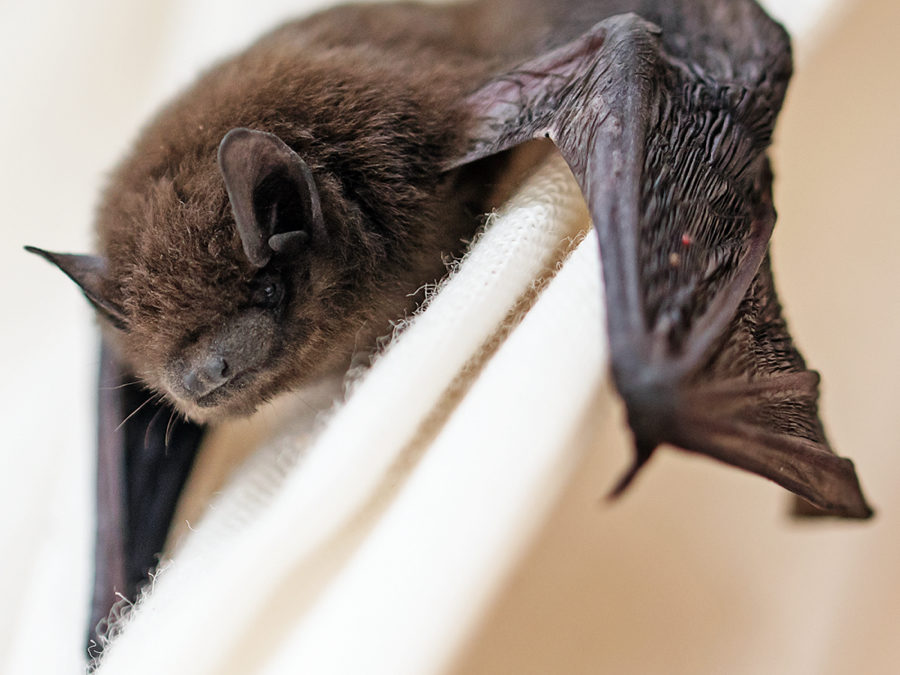The most common bat infestations found in residences in Illinois are Little Brown Bats and the Big Brown Bats. Most colonies of these bats number from a few dozen to a few hundred individuals, and while their natural habitat is generally a cave or hollow tree, they are well adapted to live in human-made structures including beneath bridges and within barns, silos, and our homes.
Bat Infestations in Homes
In addition to communicating using echolocation, bats communicate with one another using pheromones. Once a gap, crack, or vulnerability leading into a structure has been discovered by bats, the scent trails those bats leave behind hold enduring allure to others of their kind, exposing certain buildings to recurring bat infestations even after the bats are removed. Simply put, without sealing up every gap and crack, bat infestations in structures will continue, because the scent of bats that have been there in the past is a strong attractant to new bats.
Bat Rabies
While bats are important for the environment, because they eat many harmful insects such as mosquitoes, bat infestations in human-occupied structures pose a danger to the human occupants. Bats carry rabies, and while most bats are free from rabies, up to five percent of bats tested in Illinois carry the disease.
While rabies is generally 100 percent fatal once symptoms develop, it is also preventable so long as rabies shots are administered before the onset of symptoms. In the United States every year, more than 50,000 people undergo rabies shots to prevent the disease after exposure to a potentially rabid animal.
If a bat with rabies finds its way into a bedroom, it can bite or lick a sleeping person, and potentially infect the person with rabies. Bats’ teeth are so small that a sleeping person may not realize they have been bitten. In fact, the Centers for Disease Control states that if a sleeping person wakes up to find a bat in their bedroom, this constitutes an exposure, even if no evidence of a bite is detected.
Here are four of the most common questions about bats:
Q: Can I be exposed to rabies if a bat comes near me?
A: People are not at risk of rabies if a bat comes near them, as long as the bat does not make physical contact. When we move around outdoors in the evening, mosquitoes and other insects gather around us, because they are attracted to the heat of our bodies and the carbon dioxide we exhale. Bats are attracted to these insects, and they may swoop down to hunt insects near us. While it is normal to have bats come within six to 10 feet of us, it is never normal for a bat to make physical contact or to come any closer than that. If a bat bumps into a person, the person should contact their physician or the Department of Public Health.
Q: If I wake up with a bat in my bedroom and there is no sign of a bite, do I need a rabies shot?
A: Waking up with a bat in the bedroom can be a scary experience, but it is important to remain calm and make good decisions. With the right preparation, you will be just fine. Here are the steps to take if you wake up with a bat in your room:
- Close any open windows to make sure the bat does not escape.
- If there is a bathroom or closet, close those doors to limit the bat’s ability to hide.
- Exit your bedroom and close the door immediately to trap the bat inside.
- Stuff a towel under the door to block off the bat’s ability to escape into the rest of your home.
- Call a professional to capture the bat immediately.
- Request that the bat is tested for rabies right away, and ask for proof of the bat’s rabies test results within 48 to 72 hours. If you cannot obtain proof of the bat’s negative rabies status within 72 hours, you should begin the rabies shot series to prevent the onset of rabies.
- If the bat tests negative for rabies, and you have the result within 72 hours, no additional follow up is needed.
- Should the bat test positive for rabies, you should contact your physician or the Department of Public Health and go to the emergency department of your local hospital to receive rabies shots.
- If the bat escaped and was not available for rabies testing, you should contact your physician or the Department of Public Health and go to the emergency department of your local hospital to receive rabies shots.
Q: What should I do if I know that I have been bitten by a bat?
A: Wound washing is very important in the case of a known bite. Seek medical attention if you know that you have been bitten by a bat or any wild animal, so that the bite can be washed out correctly. You may even want to flush the bite with warm running water at home before you head to the hospital. The hospital will probably start you on the post-exposure prophylaxis (rabies shot) series promptly, but if the bat tests negative for rabies, they will likely stop your vaccine series after the first dose. In the coming weeks, you can save yourself from receiving additional unnecessary vaccines by making sure the bat gets tested. If the bat tests positive for rabies, you will need to complete the full vaccine series.
Q: Are bats a risk to my pets?
A: Dogs and cats can contract rabies if the pets are not vaccinated. Vaccinated pets are not at risk.
If you believe that bats may be living inside of your building, have the building inspected by a professional bat exclusion contractor. Bats have oil on their fur that creates rub marks where they are entering, and a trained professional will be able to see these rub marks and look for other signs, such as guano. Seal up any gap that is a quarter of an inch or greater to prevent bats from entering. Repeat this process every five years, as normal settling over time can expose new gaps and vulnerabilities, leading to more bat infestations.
Rebecca Fyffe is a wildlife educator with ABC Humane Wildlife Control & Prevention, Inc. She supervises a team of certified bat exclusion experts and is also the deputy director of the nonprofit Wildlife Control Policy Institute. For questions, please contact Rebecca by email at rebecca@abcwildlife.com or by telephone at (847) 870-7175.
The opinions expressed in this article do not constitute medical advice. Only your physician can give medical advice.




